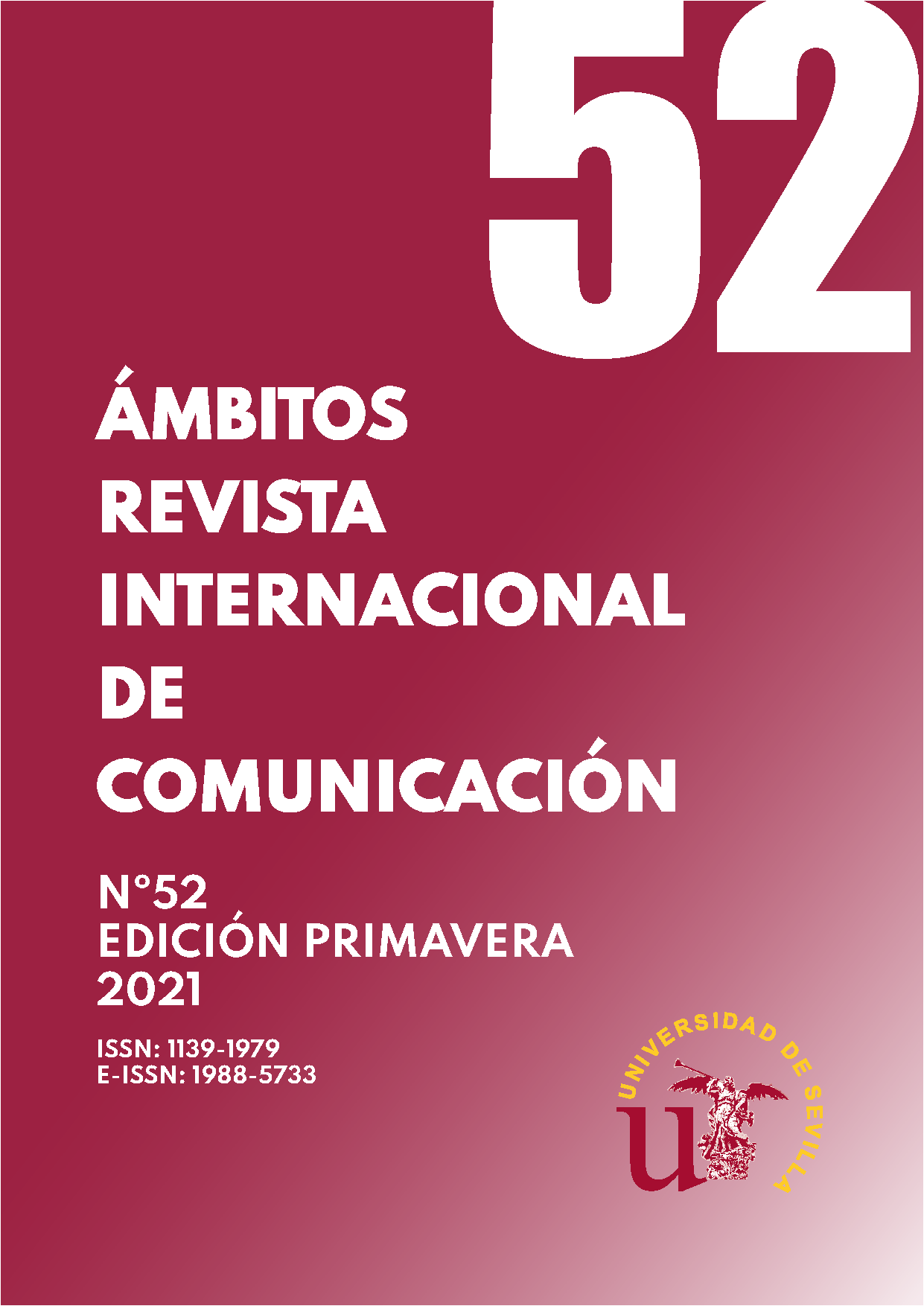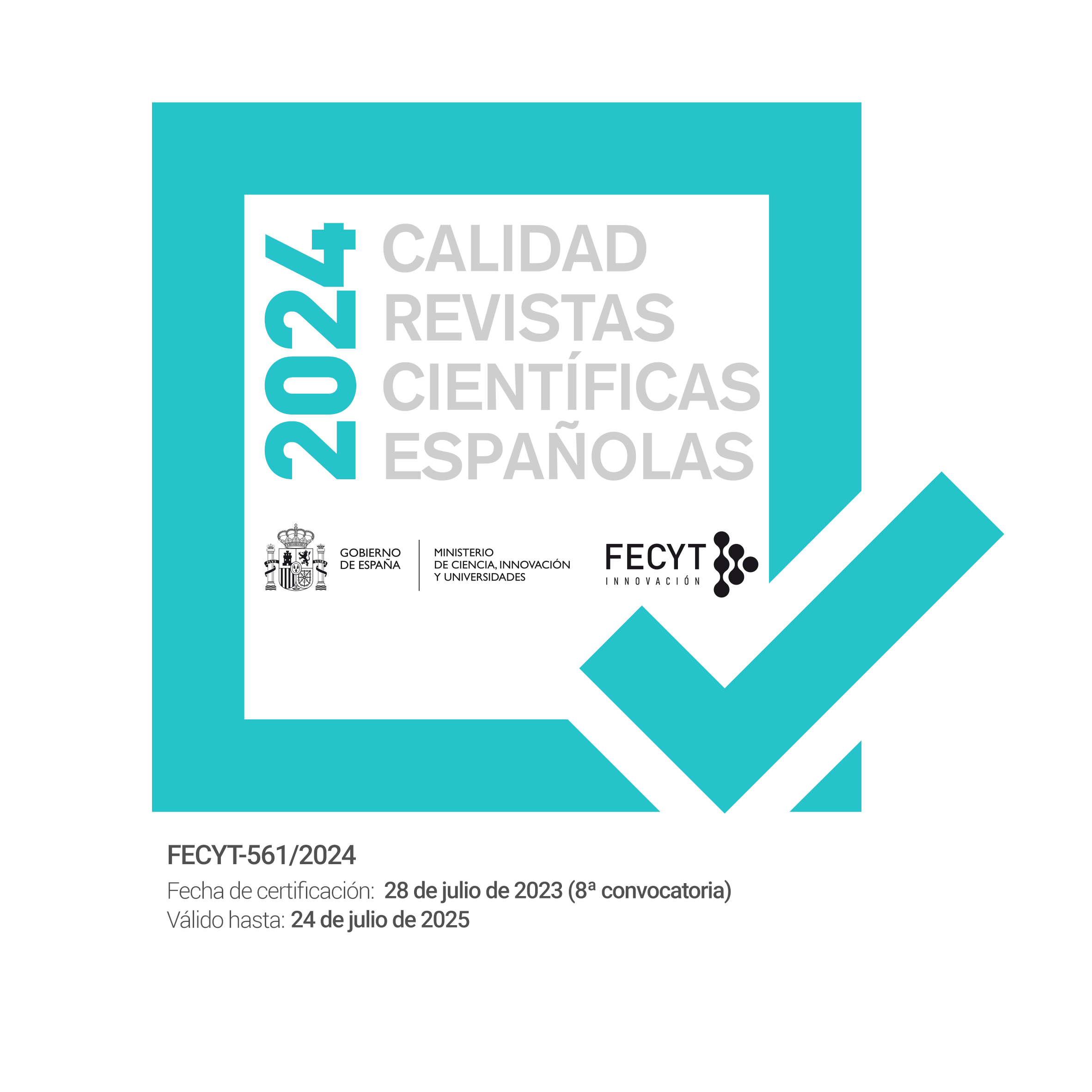El ciberactivismo, nueva forma de movilización social en la campaña del boicot comercial en Marruecos
DOI:
https://doi.org/10.12795/Ambitos.2021.i52.13Palabras clave:
ciberactivismo, prácticas tecnocomunicativas, boicot, cambio social, movilización social.Resumen
La campaña del boicot comercial en Marruecos ha dado lugar a una realidad en la que la tecnología y el activismo se han dado la mano para crear una estrategia de movilización social exitosa. El reclamo de la sociedad utilizó las nuevas tecnologías para, de forma inédita, producir un boicot comercial sustentado únicamente en el ciberactivismo. De esta forma se hicieron visibles los indicios de un cambio social latente y de una implicación comunitaria y tecnológica considerable surgidos a través de la llamada “Primavera Árabe”. En el presente artículo se analizan las prácticas tecno comunicativas efectuadas durante la campaña del boicot comercial en Marruecos, conocidas como «#moqatioune (boicoteamos)» que pretendió movilizar a la población marroquí llamándola a participar e implicarse en dicha campaña.
Para llevar a cabo este estudio se ha adoptado una metodología cuantitativa del análisis del contenido. De esta manera se ha estudiado el elemento tecno comunicativo, la narrativa expuesta y la interacción continua de mensajes, potenciados por el poder de las nuevas tecnologías, especialmente la red social Facebook, durante la campaña del boicot comercial. Los resultados principales de este estudio han demostrado que el éxito de la campaña se debe fundamentalmente a la eficacia de las estrategias de movilización. El uso de las nuevas tecnologías de la comunicación, han demostrado ser un instrumento poderoso para expandir la información, visibilizar, influir y convocar las protestas.
Descargas
Citas
Abu-Tarbush, J. (2011). El cambio Político en el mundo árabe. Colección de estudios internacionales. Número 9.
Almirat, H. (2009). Talk Morocco [Comentario de blog]. http:// www.talkmorocco.net/about/
Amirah Fernández, H. (2015). La verdadera “excepción árabe”. Real Instituto Elcano. https://goo.gl/noMZUn
Benítez-Eyzaguirre, L. (2015). Videoactivismo en Marruecos. El movimiento 20 de febrero. http://cort.as/-Iwsi
Berelson, B. (1952). Content Analysis in Communication Researches. Glencoe III, Free Press.
BetancourT, V. (2011). Ciberactivismo: ¿Utopía o posibilidad de resistencia y transformación en la era de la sociedad desinformada de la información? Chasqui, 116, 94-97.https://goo.gl/BuUyFH
Blanco, J.M. (2017, 29 de agosto). Radiografía de las redes sociales en el mundo árabe: entre el auge y el bloqueo. El Confidencial. http://cort.as/-Iwtg
Boaziz, F, Z. (2018, 1 de mayo). Un boicot comercial se vuelve campaña política contra el sistema en Marruecos. El Confidencial. http://cort.as/-IxXv
Boudal, Y. (2018, 1 de agosto). Morocco’s King Mohammed sacks minister after urging action on economy. Reuters. http://cort.as/-N6p6
Brouksy, O. (2018). Morocco: His Majesty’s Bosses Boycotted, orientxxi. http://cort.as/-N6rK.
Buamama, A. y Khaira, B. (2015). Achabakat ijtima3iya wa tahaoulat asiyasiya fi al ala, arabi [Redes sociales y transformaciones políticas en el mundo árabe]. http://cort.as/-MQOl
Caballero Quemades, F. y Monroic Climent, V. (2004). Información y conocimiento en la era de Internet. Editorial Marfil.
Castells, M. (2000). La era de la información. La sociedad red (vol. I). Alianza Editorial.
Castells, M. (2009). Comunicación y poder. Alianza Editorial.
Castells, M. (2012). Redes de indignación y esperanza. Alianza.
Catala, S. (2018). Marruecos: un boicot contra la austeridad y la corrupción. El Salto. http://cort.as/-IxYq
Dahlgren, P. (2011). Jóvenes y participación política. Los medios en la Red y la cultura cívica. Telos, 89
De la cal, L. (2018, 6 de junio). Un boicot a tres grandes marcas desestabiliza al gobierno marroquí. El Mundo. http://cort.as/-Iwt3
Edixela, B. (2020). Ciberactivismo, ejercicio de la ciudadanía y participación política en Internet. https://bit.ly/33nAhsQ
Espiritusanto, O y Gonzalo Rodríguez, P (2011). Periodismo ciudadano: evolución positiva de la comunicación. Ariel. Colección Fundación Telefónica
Fernández Prados, J, S. (2012). Ciberactivismo: conceptualización, hipótesis y medida. ARBOR Ciencia, Pensamiento y Cultura Vol. 188 - 756.
Fernandez-Planells, A, y Linares, J. (2015) Comunicación para el cambio social: uso de los dispositivos móviles y de la web social como canal de información y participación en el 15 M. Congreso #comunicambio.
Flores, V, J. Y ArrutI, A.M. (2010). Ciberperiodismo. Limusa.
Gallien, M. (2018). Is Morocco’s boycott the future of political resistance in north Africa? Middle East Eye. http://cort.as/-N6qD
Ganimi, M. (2018). Tahdidat hokoumiya baada hamlate moukataa ghair masbouka bel maghreb [Amenazas del gobierno, tras la campaña del boicot sin precedentes en Marruecos]. Al Arabia. http://cort.as/-Ixib
González-Lizárraga, M.G.; Becerra-Traver, M.T., & Yánez-Díaz, M. B. (2016). Ciberactivismo: nueva forma de participación para estudiantes universitarios [Cyberactivism: A new form of participation for University Students]. Comunicar, 46(XXIV), 47-54.
Jedidi, J. (2018). “Marruecos, Aquí, Ahora” Misterioso llamamiento a boicotear productos marroquíes. Info marruecos.ma. http://cort.as/-Ixaw
Krippendorff, K. (1990). Metodología de análisis de contenido. Teoría y práctica. Paidós.
Lasswell, Harold, D. (1985). Estructura y función de la comunicación en la sociedad. En sociología de la comunicación de masas, II. Estructura, funciones y efectos, de Miquel de Moragas (editor), Gustavo Gili.
Lopez, S. (2018, 24 de junio). Los Observadores: Boicot a productos caros en Marruecos. France24. http://cort.as/-IxZy
Masbah, M. (2018). Let it Spoil!”: Morocco’s Boycott and the Empowerment of ‘Regular’ Citizen. https://mipa.institute/6216
Otman, D. (2016). Than Mo: jaras indar linidam bel maghrib [Tahn Mo: Campana de alarma para el sistema en Marruecos]. Idaat. http://cort.as/-Iwsl
Ouled, Y. (2018). Represión en el Rif y nuevos “Hirak” en Marruecos por una vida digna. El Salto https://n9.cl/dugn7
Parejo Fernández, M. (2015). Cambio y límites en Marruecos: propuestas de reforma constitucional sobre el Gobierno. Revista CIDOB d’Afers Internacionals n.109, p. 23-44
Peregil, F. (2017, 23 de abril). El amigo del rey de Marruecos que dobló el brazo a los islamistas. El País. http://cort.as/-Iwsw
Peregil, F. (2018, 12 de mayo). El boicot en Marruecos a tres marcas se ceba con el ministro más poderoso. El País. http://cort.as/-Iwu5
Peregil, F. (2018, 27 de abril). El ministro más influyente de Marruecos, víctima de un boicot a su empresa. El País. http://cort.as/-Iwt9
Sierra Caballero, F. (2020). Ciberactivismo y nuevos movimientos urbanos: la producción del nuevo espacio público en la política contemporánea. Perspectivas de la comunicación. On-line version ISSN 0718-4867.https://bit.ly/3lksAdd
Sin Autor, (2018). El boicot en Marruecos*. Tamaimos. http://cort.as/-Iwtb
Sin Autor, EFE, (2018, 10 de mayo). Marruecos amenaza con perseguir en justicia a promotores de boicot comercial. El Periódico. http://cort.as/-IwtV
Soengas, X. (2013). El papel de Internet y de las redes sociales en las revueltas árabes: una alternativa a la censura de la prensa oficial. http://cort.as/-Iwsc
Tascón, M. y Quintana, y. (2012). Ciberactivismo. Las nuevas revoluciones de las multitudes conectadas. Los Libros de la Catarata.
Tufte, T. (2015). Comunicación para el cambio social. La participación y el empoderamiento como base en el desarrollo mundial. Icaria.
Vallés, R. (2018, 22 de julio). Lo que de verdad esconde un me gusta. La Vanguardia. http://cort.as/-Iwu_
Zairig, R (2018). Social Protest in Morocco: Does Mohammed VI Have a Plan? Middle East Eye. http://cort.as/-N6qe
Descargas
Publicado
Cómo citar
Número
Sección
Licencia
Ámbitos. Revista Internacional de Comunicación es una revista de acceso abierto, lo que significa que todo su contenido está disponible gratuitamente para el usuario o su institución. Los usuarios pueden leer, descargar, copiar, distribuir, imprimir, buscar o enlazar con el texto completo de los artículos, o utilizarlos para cualquier otro fin lícito, sin solicitar permiso previo al editor o al autor. Esta definición de acceso abierto se ajusta a la Iniciativa de Acceso Abierto de Budapest (BOAI).

A menos que se indique lo contrario, todo el contenido de la edición electrónica se distribuye bajo una " licencia internacional Creative Commons Attribution-NonCommercial-ShareAlike 4.0 ". Puede consultar la versión informativa y el texto legal de la licencia aquí. Esto debe indicarse expresamente de esta manera cuando sea necesario.
En caso de aceptación del manuscrito, los autores ceden los derechos de la obra para su publicación a Ámbitos. Revista Internacional de Comunicación bajo el contrato de licencia Reconocimiento-NoComercial-CompartirIgual 4.0 Internacional (CC BY-NC-SA 4.0). Los autores conservan los derechos de autor y terceros están autorizados a copiar, distribuir y hacer uso de la obra, siempre que cumplan con los términos y condiciones establecidos en la licencia.
- Citar la autoría y la fuente original de publicación (revista, editorial y URL de la obra).
- No los utilice con fines comerciales.
- Si remezcla, transforma o crea a partir del material, debe publicar sus contribuciones bajo la misma licencia que el original.
Se puede encontrar más información en https://creativecommons.org/licenses/by-nc-sa/4.0/deed.es



















